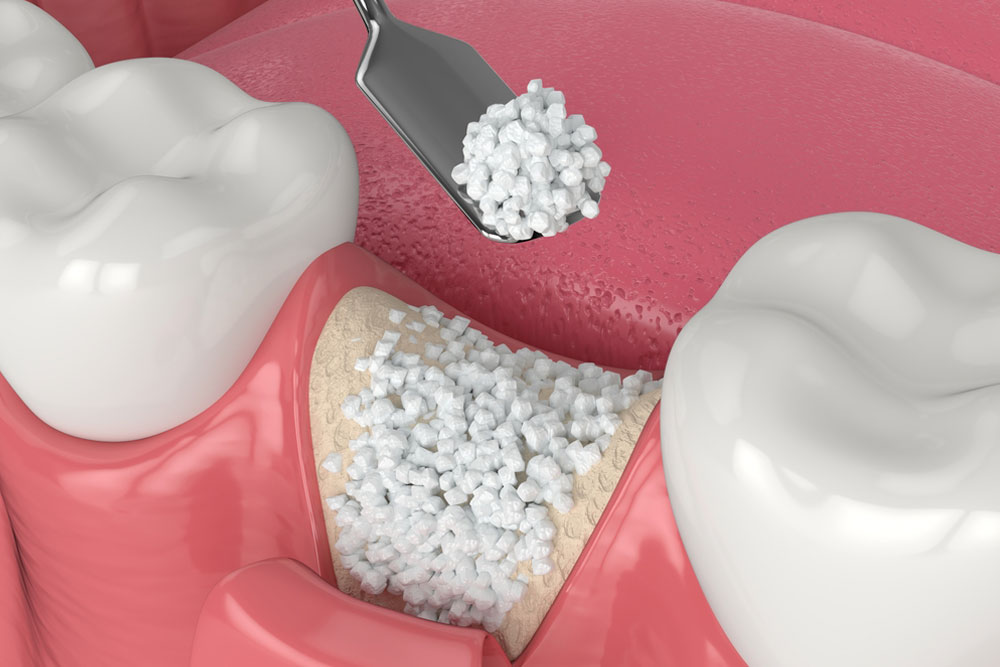The jawbone is a vital part of our oral cavity’s support system. When reconstruction of restoration work is necessary, the jawbone has to be capable of supporting the results. When bone loss occurs, it can limit the options available for these procedures. Thankfully, bone grafting can help restore the strength and resilience of the jawbone in preparation for these procedures. Bone loss in the jaw can result from injury, infection, disease, or as part of the outcome of medical treatment. Morning Star Dentistry helps patients with bone loss regain a stunning smile with bone grafting services in Sonora, CA.
Did you know…
that the majority of American adults over age 35 are missing, at least, one natural tooth? What’s more is that 1 in 4 seniors age 74 and older are missing all of their permanent teeth. Although dentures and bridges are a prosthetic option, they do not provide the same benefits available with dental implants. Implant dentistry prevents others from recognizing teeth as ‘false,’ and it also prevents the jawbone from disintegrating and any remaining natural teeth from shifting.
The Types Of Bone Grafts For The Jawbone
Infection is the primary cause of bone loss when advanced periodontal disease remains untreated. As the material within the jawbone begins to degrade, the durability and resilience of the area are impacted. This can lead to numerous problems, including tooth loss. Regardless of why your jawbone has become compromised, bone grafting can restore its durability and make it capable of accepting restorative and reconstructive work.
The degree of restoration you need will determine the type of bone graft that will be used:
- Major Bone Grafting – This type of graft is used when the jawbone has become seriously compromised. This graft is most successful when the patient’s bone is used, though other sources may be used if necessary. This type of graft is typically necessary due to tumor removal, congenital defects, or major trauma from an injury. A short hospital stay is common following a major bone graft.
- Minor Bone Grafting – Minor bone grafts are more common procedures used to restore jawbone integrity in various cases. A minor bone graft involves ridge preservation, jawbone grafting, and sinus lift procedures.
Bone loss is the underlying reason a bone graft procedure will be used, typically due to periodontal disease. However, some other common causes include:
- Periodontal disease and other dental infections
- Injuries resulting from auto accidents, sports, etc.
- Bone removal from other medical procedures
Frequently Asked Questions
Am I a candidate for dental implants?
You may be a candidate for dental implants if you are missing one or more teeth. You’ll need a complete surgical consultation with x-rays to determine whether you are in good health and have adequate bone structure to support dental implants. In some cases where the bone is not dense enough to support an implant, surgical bone grafting may make it possible to support one in the future. It is also important to ensure you do not have any existing health conditions, such as gum disease, that could cause complications with your implants.
What should I expect during a dental implant procedure?
If your oral surgeon determines that dental implants are right for you, expect the procedure to require multiple visits over the course of several months. The first treatment visit is the one when implants will be surgically placed within your jawbone. You’ll be sedated and under anesthesia during the process to ensure your comfort. Once the implants are in place, an impression will be taken and used to form crowns or dentures that will be secured to implant abutments above the gum line. The implants will need to heal for a period of 6 to 9 months before you can return to have your final crowns or dentures placed.
What should I expect during the recovery period?
Dental implant placement is a surgical procedure that requires a period of recovery. During this time, it is common to experience some swelling and soreness, as well as bleeding and minor bruising near the surgical site. Your oral surgeon will recommend eating only soft foods during the first several days following implant surgery. It is also important to follow all instructions for post-surgical care, including cleaning the surgical site and using any medications as prescribed. Be sure to contact your surgeon if you experience any fever or discomfort that worsens after a few days.
Discover If Bone Grafts Can Help Restore Your Smile
Regardless of the type of bone graft used or the source of the bone loss, the goal is to make it possible to restore form and function to your smile. The bone graft material will be packed into the area where the bone loss has occurred. This stimulates the bone to grow and integrate this new material into itself. If you’re living with bone loss in your jaw, reach out to our team today! We’ll schedule a consultation with Dr. Justin Liggett at Morning Star Dentistry in Sonora, CA, and begin your journey to a beautiful smile!


